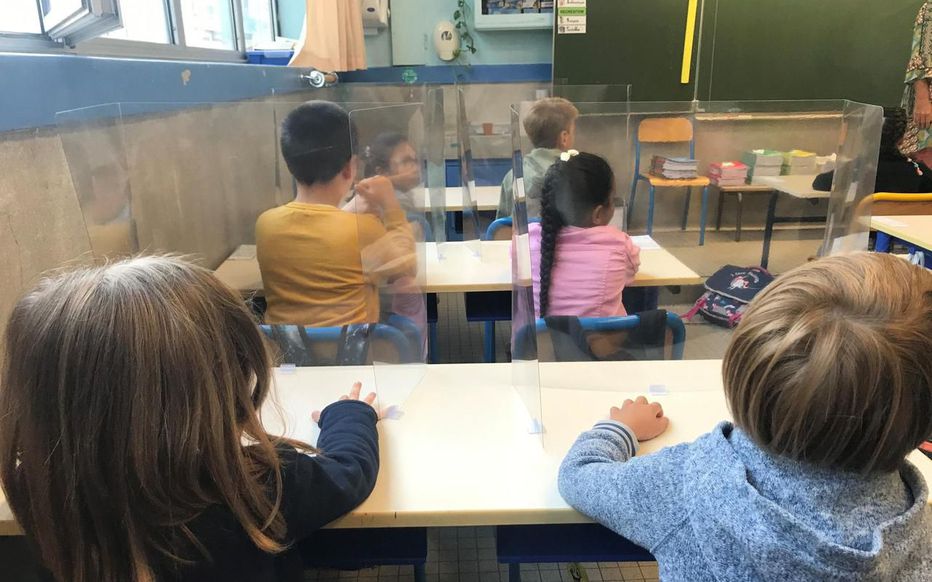A year ago, they were demanded by all workers in essential businesses and services. Today, barriers or plastic walls are present in most stores, public services and even in transport to protect bus, taxi or VTC drivers. While many brands and restaurants are due to reopen this Wednesday, government instructions strongly encourage their implementation, when it has not already been done. "A device makes it possible to physically separate the customer from the person holding the cash register, for example via a Plexiglas", it is recommended on the Bercy site. The tables of restaurants and bars outside, on the terraces, and inside for the reopening of June 9, are also targeted.
Except that experts are not convinced of their usefulness. According to a recent study conducted in schools in the United States, where these Plexiglas walls are used, they lead to an increase in the risk of contamination rather than a reduction. In their work published in Science Mag, scientists were particularly interested in the risk of the spread of Covid-19 depending on the measures put in place in establishments. While most restrictions have a positive effect on the circulation of the virus, putting up barriers between children appears to have the opposite effect.
“These walls disrupt air flow, even risking
dead
zones
where fine particles remain.
They are not blocked by these plastic barriers, ”says Francis Allard, professor emeritus at the University of La Rochelle, specialist in air flows and former member of the High Council of Public Health (HCSP).
Less useful when wearing a mask
For the expert, contacted by Le Parisien, it is necessary to recall the various vectors of propagation of the virus to judge the effectiveness of these plastic walls.
“The first risk is large droplets, like when you spit or sneeze.
There, these barriers can be useful.
Except that by wearing the mask, we already divide this risk by four, ”he explains.
They even become more “dangerous” with regard to the second contamination factor: fine particles in suspension.
They are thus stored, accumulated, behind these plates which disrupt air circulation.
1/2 We do not recommend acrylic room dividers for reducing risk of airborne transmission.
At best it does NOTHING, at worse it changes the airflow patterns in the room and can cause pooling of air, hotspots, and reduced ventilation effectiveness.
- Dr. Shelly Miller, PhD (@ShellyMBoulder) September 29, 2020
“These can stay in the air for several hours and bypass barriers,” adds Francis Allard.
There is also a risk of surface contamination, if these particles are deposited on objects, for example these Plexiglas plates ”.
The scientific work of Michael Kinzel, professor of mechanical and aerospace engineering at the University of Florida, was able to model these fine particle diffusions, as can be seen in the video below, despite the presence of masks and walls.
Some specialists also compare the spread of these particles to that of cigarette smoke, for example in smoking areas at international airports.
However, according to previous work, notably from the University of Colorado, they justify their use "to avoid direct transmission.
aerosols when people are nearby and the distance cannot be maintained ”, for example during a television broadcast.
Several channels have also decided to use it in France, such as Cyril Hanouna's talk show, “Touche pas à mon poste”.
A psychological effect
Not to mention that these walls sometimes give rise to absurd scenes, when the interlocutors go beyond the Plexiglas to make themselves understood, and get closer to their counterpart, then increasing the risk of contamination since they do not always wear mask.
Read also Air transmission of the coronavirus: the investigation which validates the usefulness of wearing a mask
On the other hand, for Francis Allard, these partitions encouraged to be installed on the terraces could "be useful".
“People will not have masks, will drink, talk, laugh.
This will complement the distances between the tables and the natural ventilation.
There is also a psychological aspect, ”he concludes.
All the experts finally agree on the same point: the essential measure of protection in closed places remains regular ventilation.
Still, transparent barriers have a bright future ahead of them, to the great satisfaction of the dozens of companies that have adapted to manufacture them.

